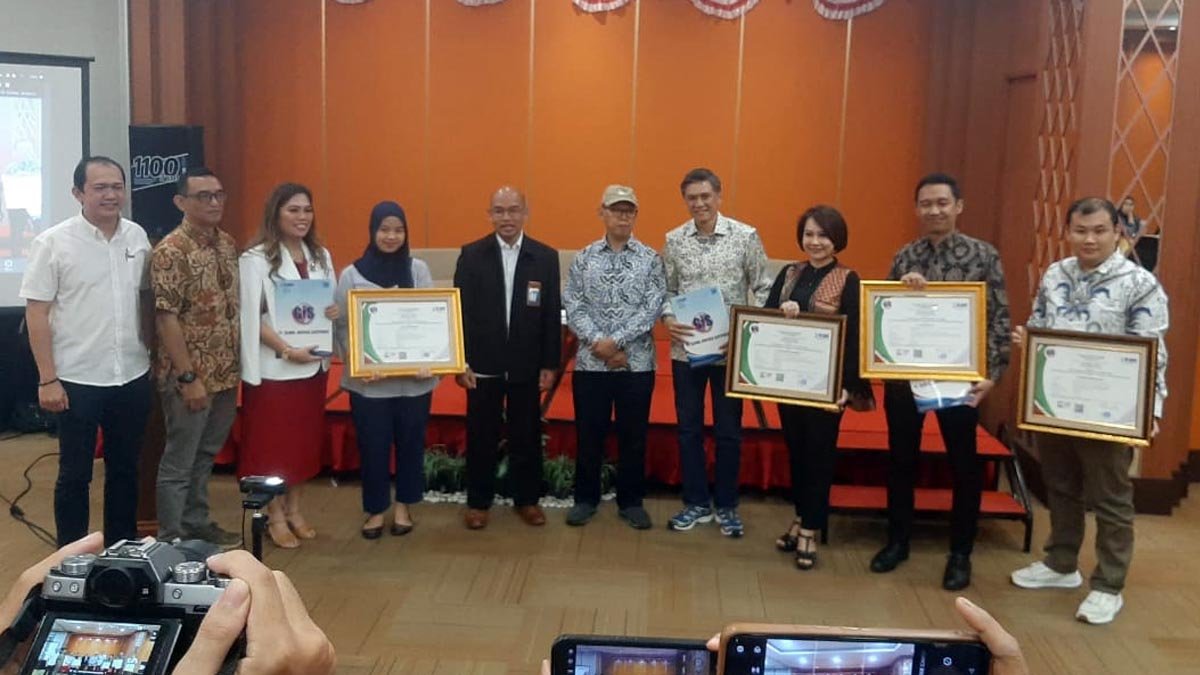PALMOILMAGAZINE, BSD City – Sustainability standards in the palm oil industry continue to gain momentum, both nationally and globally. One of the key instruments driving responsible practices is the Indonesian Sustainable Palm Oil (ISPO) certification, which not only ensures regulatory compliance but also strengthens environmental, social, and economic sustainability.
As an accredited certification body (LSISPO-005-IDN) under the National Accreditation Committee (KAN), PT Global Inspeksi Sertifikasi (GIS) has reaffirmed its commitment to supporting good governance and sustainable supply chains in the palm oil sector.
This commitment was reflected during the event “ISPO Certificate Handover and Webinar on Supply Chain Implementation in Agriculture & Updates on ISPO in Indonesia”, held on August 25, 2025, in BSD City, Tangerang. The gathering brought together plantation executives, industry practitioners, and key stakeholders—underscoring a shared mission to strengthen ISPO implementation across both upstream and downstream sectors.
Also Read:
Opening the event, GIS Director Vera Marini highlighted the importance of the certification scheme. “Through this event, we want to enhance industry players’ understanding of ISPO certification and sustainable supply chain practices. By doing so, Indonesia’s palm oil and agriculture sectors will become more competitive and gain wider recognition in the global market,” she said.
As a token of recognition, GIS awarded ISPO certificates and plaques of appreciation to four palm oil companies that successfully met sustainability standards:
- PT Kurnia Luwuk Sejati
- PT Adhyaksa Dharmasatya
- PT Candi Artha
- PT Lunik Anugerah
The recognition is expected to encourage more companies to take sustainability principles seriously in their daily operations. Vera further emphasized that stronger downstream ISPO adoption will not only improve international market confidence in Indonesian products but also bring tangible benefits to environmental protection and community welfare.
During the event, ISPO practitioner Dedi Junaedi outlined strategies for building efficient, transparent, and sustainable agricultural supply chains. He stressed the importance of integrating upstream and downstream sectors, leveraging technology, and ensuring compliance with ISPO standards as a guarantee of quality.
“Cultivation must follow sustainability principles. If companies operate illegally in forest areas, firm sanctions are necessary. A robust supply chain integrates licensing, technology, and quality seedlings to increase productivity without harming the environment,” Dedi explained.
Expanding ISPO’s Scope
Also speaking at the event, Gufron Said, Director of Accreditation Harmonization Systems at the National Standardization Agency (BSN), introduced Presidential Regulation (Perpres) No. 16 of 2025, which broadens ISPO certification to cover plantations, downstream industries, and bioenergy.
The expanded scope involves three ministries—the Ministry of Agriculture, Ministry of Industry, and Ministry of Energy and Mineral Resources—alongside KAN as the accreditation authority. According to Gufron, the new framework requires coordinated regulatory adjustments, including revisions to Ministry of Agriculture Regulation No. 38.
The transition periods will differ:
- Plantations: four years after the regulation takes effect.
- Downstream & bioenergy: two years after the regulation takes effect.
The regulation also outlines principles, criteria, requirements, implementation procedures, and sanctions for certification bodies. Importantly, certification bodies are required to submit regular reports to the ISPO Committee via its Secretariat. Failure to report can result in administrative sanctions by KAN, ranging from verbal warnings to suspension or revocation of accreditation.
With these new measures, Indonesia is reinforcing its commitment to sustainable palm oil—ensuring not just compliance, but also long-term environmental and social responsibility. (P3)
